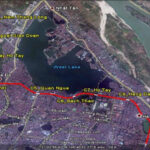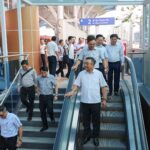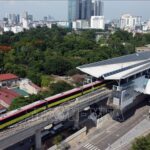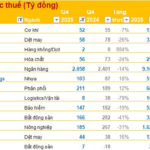Priceless Lessons from the Metro Project
It’s been 12 years since the construction of Ho Chi Minh City’s first metro line, Route 1 (Ben Thanh – Suoi Tien), began. The super project, worth 47 trillion VND, has faced numerous challenges and delays, but most of the issues have now been resolved. According to the Ho Chi Minh City Urban Railway Management Authority (MAUR), the project is currently over 98% complete. In its final stages, the remaining obstacles related to contractors have been addressed, and the metro is set to commence commercial operations by the end of this year.
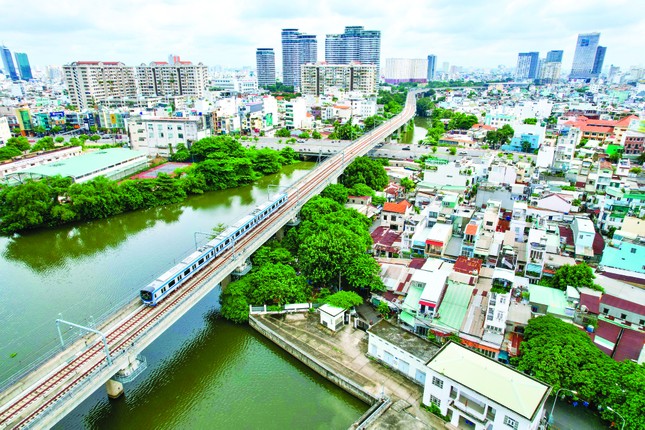
Ho Chi Minh City’s Route 1 metro project is expected to be operational by the end of 2024. Photo: Duy Anh
Mr. Nguyen Quoc Hien, Acting Head of MAUR, shared that there are only three urban railway management boards in Vietnam. One is under the Ministry of Transport, overseeing the Cat Linh – Ha Dong route, another is under the Hanoi People’s Committee, managing Route 3 (Nhon – Hanoi Railway Station), and the third is MAUR, responsible for Route 1 (Ben Thanh – Suoi Tien). A common challenge faced by all three metro projects is delays and cost overruns.
“This indicates that we are facing systemic issues and other problems. Metro projects are massive undertakings, costing billions of dollars. Only a handful of projects in Vietnam have such high investment values. While the technology is not new globally, it is novel in our country. As a result, the teams managing these projects across the three boards have had to learn and adapt as they go,” Mr. Hien acknowledged.
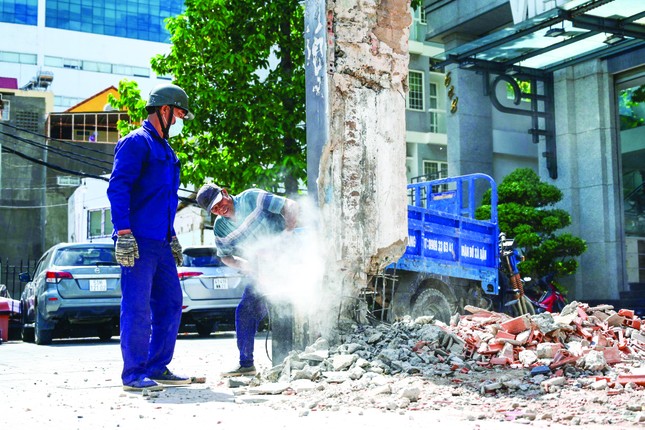
MAUR is applying lessons from Route 1 to ensure a smooth start for the upcoming Route 2 project. Photo: Duy Anh
The Acting Head of MAUR emphasized that the lessons learned from Route 1 will serve as a benchmark for future metro lines in Ho Chi Minh City. Specifically, the first lesson being applied to Route 2 (Ben Thanh – Tham Luong) is the importance of securing a clear site above and below ground before construction begins.
“Between 2030 and 2040, Ho Chi Minh City will develop five new urban centers based on a multi-center model. Metro lines will play a crucial role in addressing current traffic congestion and facilitating the realization of this multi-center urban model.”
Mr. Phan Van Mai, Chairman of the Ho Chi Minh City People’s Committee
“Site preparation requires thorough surveys, but this was lacking in Route 1, leading to numerous issues during construction and resulting in extended timelines and increased costs… A typical metro project takes around 5 to 6 years to complete, but we’ve been working on Route 1 for 12 years now,” Mr. Hien shared.
Another key lesson is the importance of legal framework. The Route 1 project was halted due to legal issues and a lack of legal basis for its implementation. Equally important is contract management. Many problems in Route 1 arose from unclear responsibilities among parties, leading to disputes between contractors and consultants, which impacted the project’s progress.
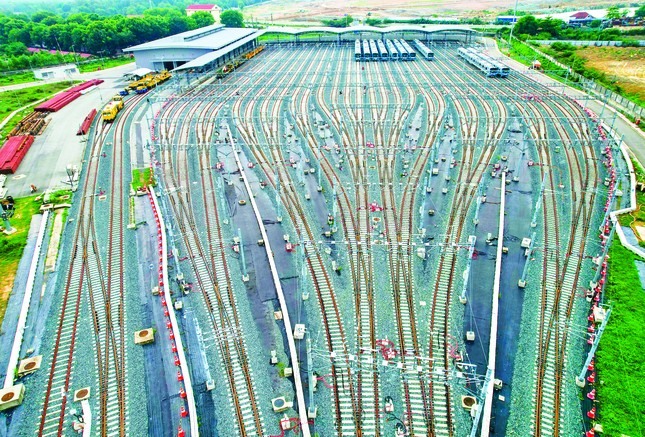
A view of the Long Binh Depot in Thu Duc City. Photo: Duy Anh
Mr. Hien pointed out that while the metro projects follow international contracts (FIDIC), they also need to comply with Vietnamese laws. Certain procedures, if conducted solely based on FIDIC, would be faster, but due to legal requirements, approvals and consultations are necessary. He suggested that there should be more delegation and authority given to project owners, as constant reporting and approval-seeking can lead to delays, complaints, and additional costs.
Lastly, MAUR’s leadership emphasized the importance of operations, maintenance, and training for future metro projects. Integration and connectivity should be considered from the outset to ensure a smoother transition during the final stages of preparation for operations.
Accelerating the Completion of the Metro System
Mr. Vu Van Vinh, Director of Project Management Unit 2 under MAUR, shared that while Route 1 is in its final stages, the construction of Route 2 is also underway. They are in the process of relocating technical infrastructure to prepare a clear site for the main contract, which is expected to commence by the end of 2025. So far, 584 out of 586 cases requiring clearance have agreed to hand over the site, achieving a rate of 99.6%. Contractors have started relocating technical infrastructure at 12 locations, including 10 stations and two open-cut sections in the Ben Thanh and Ba Queo areas. In 2024, MAUR aims to complete the relocation of key components such as water supply and drainage systems at all station locations, and by mid-2025, the remaining components will be finished. All efforts are geared towards starting the main contract by the end of 2025 and launching Route 2 by 2030.
By 2035, Ho Chi Minh City aims to have 200 kilometers of urban railway. This ambitious goal presents both a significant challenge and a valuable opportunity to complete the city’s metro system. According to Mr. Tran Quang Lam, Director of the Ho Chi Minh City Department of Transport, achieving this target requires special mechanisms and policies to expedite investment preparation procedures. The Department has submitted 28 special mechanisms to the Ho Chi Minh City People’s Committee for consideration and subsequent submission to authorized agencies. Once the proposal is finalized, the Ministry of Transport will seek feedback from relevant ministries, and it is expected that the National Assembly will issue the necessary mechanisms and policies by the end of this year.
According to the proposal, by 2035, Ho Chi Minh City will have completed six metro routes. Route 1 (Ben Thanh – Suoi Tien), spanning 19.7 kilometers, will be extended by nearly 21 kilometers from Ben Thanh to An Ha (Binh Chanh District), bringing the total length to 40.8 kilometers. Route 2 (Ben Thanh – Tham Luong), measuring over 11 kilometers, will be expanded with two additional sections totaling 9.1 kilometers: Ben Thanh – Thu Thiem and Tham Luong – An Suong Bus Station, resulting in a total length of 20.2 kilometers. Additionally, Ho Chi Minh City will complete four other routes: Route 3 (Hiep Binh Phuoc – Dan Chu Roundabout – Tan Kien – An Ha) with a length of 29.5 kilometers; Route 4 (Dong Thanh Depot – Ben Thanh – Ba Chiem Station on Ring Road 3) spanning 36.8 kilometers; Route 5 (Vo Chi Cong Station on Ring Road 2 – Bay Hien Intersection – Da Phuoc Depot) measuring 32.5 kilometers; and Route 6 (Ba Queo – Tan Son Nhat Airport – Binh Triieu – Phu Huu) with a length of 22.8 kilometers. The total investment for these projects (excluding Route 1) is estimated at 837 trillion VND.
“Hanoi Residents Can Finally Ride the $1.5 Billion Metro Line After a 14-Year Wait”
Chairman Tran Sy Thanh experienced a trial ride on the Nhon – Hanoi Railway metro project and has requested that the investor commence operations of the elevated section from August 8th onwards.
The Sky’s the Limit: Unveiling the Nhon-Hanoi Railway’s Commercial Operation
On August 3rd, the Management Board of the Hanoi Urban Railway announced that the State Council for Inspection and Acceptance of Construction Works has approved the conditional acceptance and agreed to commence commercial operations for the elevated section of the pilot urban railway project in Hanoi, from Nhon to Hanoi Station, in the near future.

